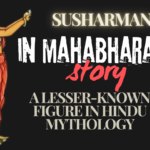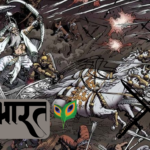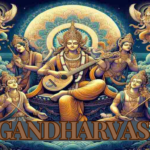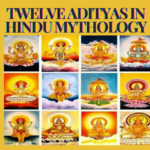In the vast tapestry of Hindu mythology, few figures are as iconic and influential as Narada. A Vedic sage, Narada is revered in Hindu traditions, not only as a divine messenger, but also as a traveling musician and storyteller who weaves wisdom into every story. His presence is felt in many sacred texts, including the Mahabharata, the Ramayana, and the Puranas. Narada’s role as a bearer of news and knowledge makes him one of the most important saints in Hinduism, symbolizing devotion, wisdom, and a sense of cosmic order.
Some details about narada
| Aspect | Details |
|---|---|
| Sanskrit Name | नारद (Nārada) |
| Parentage | Mind-born son of Brahma |
| Role | Devarishi (Divine Sage), Messenger between gods and humans |
| Key Attributes | Traveling musician, storyteller, bearer of news, and divine wisdom |
| Prominent Texts | Mahabharata, Ramayana, Puranas |
| Instrument | Veena (Musical instrument) |
| Divine Focus | Devotee of Lord Vishnu |
| Iconic Greeting | “Narayana, Narayana” |
| Notable Stories | Warning Ravana in the Ramayana, advising Yudhishthira in the Mahabharata |
| Philosophical Contribution | Bhakti Yoga teachings, Narada Bhakti Sutra |
| Cultural Depiction | Mischievous yet wise sage, often a harbinger of truth and justice |
| Legacy | Symbol of devotion, Dharma, and the importance of spiritual wisdom |
Divine origin of Narada
Narada (Sanskrit: नराद, Narada) is considered to be the mental son of the creator Brahma in the Hindu trinity. As a devarishi (divine sage), Narada is considered a bridge between gods and humans, often descending to earth to impart wisdom and facilitate cosmic balance. He is a divine being who roams around in the three worlds – heaven, earth and underworld – with the sole purpose of propagating devotion and religion.
Narada in Mahabharata
Narada’s most prominent appearance is in the epic Mahabharata. He is known for his important role in guiding the Pandavas, especially Yudhishthira, the eldest of the Pandava brothers. In the Mahabharata, Narada tells Yudhishthira the story of Prahlada, a young devotee of Vishnu who remains steadfast in his faith despite suffering from his demon father Hiranyakashyapa. The story is a powerful reminder of the power of devotion and the protection it offers to believers.
Narada’s wisdom and advice help the Pandavas overcome the complexities of their lives, ensuring they stay true to their dharma. Narada often uses parables and stories to convey deep spiritual truths, making him a revered figure in Hindu literature.
Story of Why Narada Cursed Vishnu.
Narada proceeded to search in the mirror and he saw he had the substance of a monkey. Furthermore, he blew up, he took a few Ganga Jal in his grasp and he said, “Vishnu, I requested that you make me wonderful so I could get the core of my darling and win my dearest, and on second thought you transformed me into a monkey. What’s more, presently I’ve lost my dearest, I revile you Vishnu! You will lose your adored, and get through the agonies of detachment from her. Also, to get her back you’re rolling to warm up to endlessly monkeys will be your partners, and your guardian angels, and your lovers. What’s more, you feel that it’s entertaining that I seem to be a monkey and I lost my cherished, here, is my Curse”
Narada in Ramayana
In the Ramayana, Narada’s role is equally important. He is famous for warning Ravana, the demon king of Lanka, about the dire consequences of his actions. When Ravana’s ego leads him to abduct Lord Rama’s wife Sita, Narada prophesies the downfall of the mighty king and attempts to stop him from his path of destruction. Despite his warnings, Ravana’s arrogance ultimately leads to his downfall, fulfilling Narada’s prophecy.
Narada’s involvement in the Ramayana highlights his role as a harbinger of truth and justice. His warnings to Ravana are a reminder of the importance of humility and righteousness, which are central themes to Hindu philosophy.
Narada in the Puranas
The Puranas, a genre of ancient Indian literature, further expand on the legends of Narada. In these texts, Narada is depicted as an eternal traveller who moves freely between the divine and mortal realms. His character is multifaceted – he is a trickster, a sage, a musician and, above all, a devotee of Vishnu.
One of the most notable mythological stories associated with Narada is the tale of his rivalry with the gods, particularly Indra, the king of heaven. In one such story, Narada’s devotion to Vishnu provokes jealousy in Indra, triggering a series of divine contests. These stories often portray themes of devotion, humility and the transient nature of power.
Role of Narada in Hindu philosophy
Narada is not only a mythological figure but also an important contributor to Hindu philosophy. His teachings, especially on bhakti yoga (the path of devotion), are foundational to many Hindu practices. The Narada Bhakti Sutra, which bears his name, outlines the principles of devotion and its role in attaining moksha (liberation). Through this text, Narada emphasizes the importance of selfless devotion and surrender to the divine will as the highest forms of spiritual practice.
Narada’s influence in Hindu culture
Narada’s influence extends beyond religious texts to the cultural fabric of Hindu society. He is often depicted as a wandering sage with Veena (a musical instrument) in his hand, spreading the message of devotion through his music. His iconic salutation, “Narayana, Narayana,” is a reminder of his unwavering devotion to Lord Vishnu.

In popular culture, Narada is often portrayed as a mischievous but wise sage whose actions, though sometimes confusing, always serve a higher purpose. His character reflects the complexities of the spiritual journey, where the lines between good and evil, wisdom and foolishness, are often blurred.
The Legacy of Narada
The legacy of Narada is one of enduring wisdom and divine purpose. As one who transcends the boundaries of the mortal and divine worlds, Narada represents the ideal of spiritual devotion and cosmic order. His stories, teachings, and music inspire millions, making him a timeless figure in the vast pantheon of Hinduism.
Narada’s role as a messenger, musician and sage is a testament to the power of devotion and the importance of following one’s dharma. Through his travels and teachings, Narada has left an indelible mark on Hindu culture, one that continues to resonate among devotees and scholars alike.






